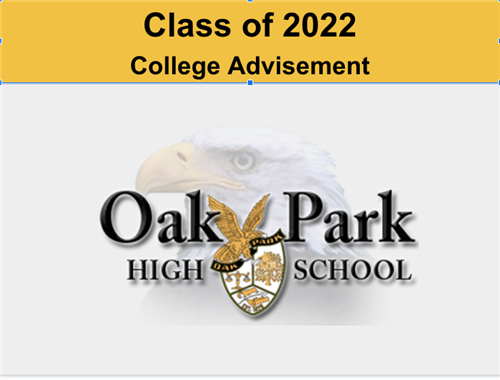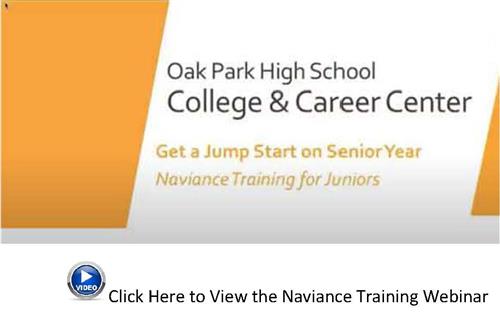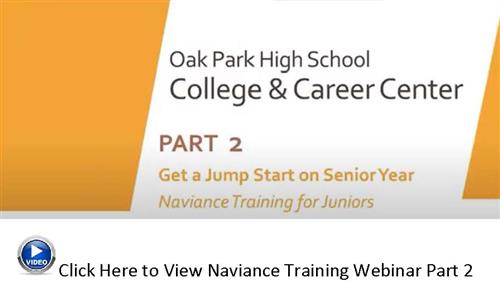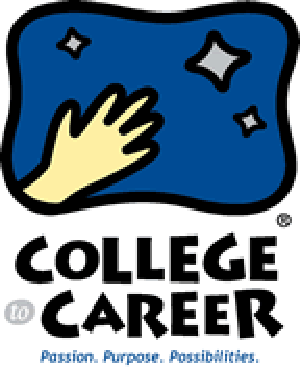Junior Year
-
 Watch these Naviance Training Videos to Prepare for the College Application Process
Watch these Naviance Training Videos to Prepare for the College Application Process 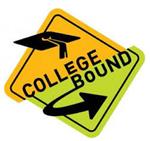 Juniors are faced with their most intense academic experience in high school and need to be mentally and physically prepared for a very demanding year. Students preparing for a highly selective college should be enrolled in a set of rigorous classes that may include between 2-4 Honors and/or Advanced Placement classes. However, even without AP/Honors classes, all OPHS juniors will experience the high expectations of a college preparatory curriculum which anticipates that students have begun to emerge as young adults who are organizing their time and prioritizing their interests in order to put their best foot forward. Besides the challenging coursework, juniors have to pay attention to participating in a testing sequence that will enable them to take advantage of the admission options they will encounter as seniors. It is also the time when they begin to define their “lists” of colleges that change and evolve over the course of the year.The “To Do” list for juniors is much more detailed than the first two years of high school:
Juniors are faced with their most intense academic experience in high school and need to be mentally and physically prepared for a very demanding year. Students preparing for a highly selective college should be enrolled in a set of rigorous classes that may include between 2-4 Honors and/or Advanced Placement classes. However, even without AP/Honors classes, all OPHS juniors will experience the high expectations of a college preparatory curriculum which anticipates that students have begun to emerge as young adults who are organizing their time and prioritizing their interests in order to put their best foot forward. Besides the challenging coursework, juniors have to pay attention to participating in a testing sequence that will enable them to take advantage of the admission options they will encounter as seniors. It is also the time when they begin to define their “lists” of colleges that change and evolve over the course of the year.The “To Do” list for juniors is much more detailed than the first two years of high school:-
Students should be even more focused on their extracurricular activities this year, reaching for leadership and excellent performance in their chosen interests.
-
This summer between the junior & senior year is the last opportunity you have to make up any “D” grades you may have earned in college preparatory courses. Remember, even though a “D” earns credit for high school it is unacceptable for most colleges and universities!
-
Stay organized. During this year, especially after taking the PSAT, colleges will begin to send large amounts of material to you. It helps if you file information alphabetically or by the state in a file cabinet or large container.
-
The spring of the Junior year is "testing mania" time. This is the time for students to be taking the SAT Reasoning Test and/or the ACT along with the SAT Subject Tests if you plan to apply to a UC. Much more detail follows lower on this web page.
-
If you are interested in a military academy or ROTC, the process should begin in the fall of the junior year by contacting your local state representative who has the nomination papers and an outline of the procedures.
- Seriously begin the process of visiting colleges over the summer. Try to incorporate these visits into family vacations!
- GRADES! Finish this year strong - these are the last grades you will have to show your colleges when you apply in the fall. The Senior year is essentially all "in progress" on your or your college applications!
 11th grade College Advisement HandoutCollege & Career Center Become a frequent visitor to the College & Career Center located inC-6, next door to the OPHS Student Store. The center has accumulated many guidebooks as well as scholarship opportunities, post-graduate options, and computers dedicated to college & career searches.
11th grade College Advisement HandoutCollege & Career Center Become a frequent visitor to the College & Career Center located inC-6, next door to the OPHS Student Store. The center has accumulated many guidebooks as well as scholarship opportunities, post-graduate options, and computers dedicated to college & career searches.AP & Honors Information For students who have a genuine passion for a particular subject and have done well (i.e. 'A" grades) should consider taking an Honors or AP class. The OPHS "AP & Honors Information Page" will give you more information about these courses as well as how they factor into the college admission decision process! Resist the temptation to sign up for multiple AP/Honors courses because it seems to be required for a particular university - this strategy will backfire when the combined workload of multiple advanced courses begins to crush a student's spirit. Ultimately, there is a college out there for every student based on their unique combination of skills, abilities, SAT's, extracurriculars, & academic transcript!
 GPA A student's high school GPA is one of the most misunderstood topics that we encounter. This is because there is no single GPA formula that applies to all students, in all situations. Every high school has the freedom to assign weighted grade points to their GPA's - or not, as they see fit. Furthermore, depending on who (or which institution) is viewing a student's transcript, they all have differing views on how to calculate the GPA, what classes to include in the GPA, and whether to assign weighted grade points. The most important thing to understand is that colleges do not use a high school's GPA formula for their admission decisions! For more information please refer to the GPA link on our website.
GPA A student's high school GPA is one of the most misunderstood topics that we encounter. This is because there is no single GPA formula that applies to all students, in all situations. Every high school has the freedom to assign weighted grade points to their GPA's - or not, as they see fit. Furthermore, depending on who (or which institution) is viewing a student's transcript, they all have differing views on how to calculate the GPA, what classes to include in the GPA, and whether to assign weighted grade points. The most important thing to understand is that colleges do not use a high school's GPA formula for their admission decisions! For more information please refer to the GPA link on our website. Class Rank Oak Park High school does not Rank! Many private/independent universities and scholarships want to know how a student has performed within the context of their school. In the class of 2020 alone there are 22 OPHS seniors with perfect 4.0 GPA's and 85 more with unweighted GPAs of 3.75 or higher. At Oak Park High School an outstanding GPA of 3.75 does not even place a student in the top 10% of their class! Furthermore, we have an additional 73 seniors with cumulative unweighted GPA’s between 3.50 and 3.75 that would only rank them in the top 30% of their class. At a high performing school such as ours, it is a challenge to adequately give recognition to so many outstanding students. As a result, we chose six years ago to delete a student’s class rank from our transcripts. This practice is gaining wide acceptance at the country's most prestigious college preparatory high schools. Accordingly, whenever a class rank is requested, we simply respond “Oak Park H.S. does not rank.” For more information please refer to the Class Rank page on our website.Also, click here for more information about GPA vs. Course Rigor in College AdmissionsOPHS Campus Clubs It's not too late to get involved with any of our Campus Clubs. They provide students with a wide range of interests to meet other like-minded students, as well community service & leadership opportunities!
Class Rank Oak Park High school does not Rank! Many private/independent universities and scholarships want to know how a student has performed within the context of their school. In the class of 2020 alone there are 22 OPHS seniors with perfect 4.0 GPA's and 85 more with unweighted GPAs of 3.75 or higher. At Oak Park High School an outstanding GPA of 3.75 does not even place a student in the top 10% of their class! Furthermore, we have an additional 73 seniors with cumulative unweighted GPA’s between 3.50 and 3.75 that would only rank them in the top 30% of their class. At a high performing school such as ours, it is a challenge to adequately give recognition to so many outstanding students. As a result, we chose six years ago to delete a student’s class rank from our transcripts. This practice is gaining wide acceptance at the country's most prestigious college preparatory high schools. Accordingly, whenever a class rank is requested, we simply respond “Oak Park H.S. does not rank.” For more information please refer to the Class Rank page on our website.Also, click here for more information about GPA vs. Course Rigor in College AdmissionsOPHS Campus Clubs It's not too late to get involved with any of our Campus Clubs. They provide students with a wide range of interests to meet other like-minded students, as well community service & leadership opportunities! Even if you haven't done much Volunteer or Community service up until now - it's not too late! We have a web page devoted to community service leadership & volunteer programs which you can access by clicking on the following hyperlink: SAT & ACT Information The SAT and/or the ACT Test should definitely be taken at least once (preferably twice) during the spring semester of the junior year - usually in April and/or May. There are June test dates available, for those who need a back-up date. However, the June date is primarily used by students who need to take the SAT "Subject tests" (see below). Both the SAT Test and the ACT Test are accepted equally by virtually every college & university in the country. Click the link above to learn more about the differences between the SAT and the ACT.
Even if you haven't done much Volunteer or Community service up until now - it's not too late! We have a web page devoted to community service leadership & volunteer programs which you can access by clicking on the following hyperlink: SAT & ACT Information The SAT and/or the ACT Test should definitely be taken at least once (preferably twice) during the spring semester of the junior year - usually in April and/or May. There are June test dates available, for those who need a back-up date. However, the June date is primarily used by students who need to take the SAT "Subject tests" (see below). Both the SAT Test and the ACT Test are accepted equally by virtually every college & university in the country. Click the link above to learn more about the differences between the SAT and the ACT. Students can actually improve their overall chances by taking both the ACT and the SAT! The ACT is a three-hour multiple-choice examination of four major curriculum areas: English, Math, Reading, and Science Reasoning. Usually, students whose worst subject is Math do better on this test! It was designed to be taken by High School students towards the end of their Junior year. The four sections scores are converted to scaled scores between 1-36. Virtually all colleges and universities (with the exception of Caltech in California) accept it as a qualifying entrance examination. It may be re-taken without penalty. For more information on the ACT click on the following hyperlink: ACT Test Details
Students can actually improve their overall chances by taking both the ACT and the SAT! The ACT is a three-hour multiple-choice examination of four major curriculum areas: English, Math, Reading, and Science Reasoning. Usually, students whose worst subject is Math do better on this test! It was designed to be taken by High School students towards the end of their Junior year. The four sections scores are converted to scaled scores between 1-36. Virtually all colleges and universities (with the exception of Caltech in California) accept it as a qualifying entrance examination. It may be re-taken without penalty. For more information on the ACT click on the following hyperlink: ACT Test Details The College Board is the company that sponsors the PSAT, the SAT, athe AP program. You can access their website at the following webpage: https://collegereadiness.collegeboard.org/
The College Board is the company that sponsors the PSAT, the SAT, athe AP program. You can access their website at the following webpage: https://collegereadiness.collegeboard.org/ The PSAT All college-bound juniors should sign up to take the PSAT, which also includes a section called the “NMSQT” (National Merit Scholarship Qualifying Test). The PSAT is a practice test for the SAT, but the NMSQT is a separate organization that determines the highest level testers in the United States. Qualification at this tier can mean special recognition and scholarship opportunities for students. For more information on the PSAT, click on the "PSAT" hyperlink. Test Preparation The results of the PSAT come in late December or early January. Based on the results, students may decide they would like to enroll in a SAT prep course. All students should consider doing some form of test preparation prior to taking the SAT Reasoning Test or the ACT in the spring of their Junior year. At the very least, students should work through one of the many “test prep” books or CD’s that can be purchased at any bookstore. Many of the most reputable test preparation services are accessible via our "Test Preparation" web page. The Oak Park PFC also sponsors several "Mock ACT & SAT" test opportunities. For more information click on theMock ACT & SAT test hyperlink.
The PSAT All college-bound juniors should sign up to take the PSAT, which also includes a section called the “NMSQT” (National Merit Scholarship Qualifying Test). The PSAT is a practice test for the SAT, but the NMSQT is a separate organization that determines the highest level testers in the United States. Qualification at this tier can mean special recognition and scholarship opportunities for students. For more information on the PSAT, click on the "PSAT" hyperlink. Test Preparation The results of the PSAT come in late December or early January. Based on the results, students may decide they would like to enroll in a SAT prep course. All students should consider doing some form of test preparation prior to taking the SAT Reasoning Test or the ACT in the spring of their Junior year. At the very least, students should work through one of the many “test prep” books or CD’s that can be purchased at any bookstore. Many of the most reputable test preparation services are accessible via our "Test Preparation" web page. The Oak Park PFC also sponsors several "Mock ACT & SAT" test opportunities. For more information click on theMock ACT & SAT test hyperlink.- Complete 15 UC-required college-preparatory ("a-g") courses, with 11 of those done by the end of 11th grade,
- Maintain a GPA of 3.0 or better (weighted by honors/AP bonus points) in these courses, and
- Take the ACT with Writing or SAT Reasoning Test
- SAT Subject Tests are now optional
- Eligibility in the Local Context status is offered to the student's in the top 9 percent of their class (this does not guarantee admission to a specific campus).
 The (CSU) California State University system has established a system-wide homepage that provides hotlinks to all CSU campus homepages. School comparisons by region, SAT/ACT scores, major, and GPA are available. CSU applications are also be submitted through this site! You must disable your "pop-up" blocker to use the application feature. It can be accessed at: https://www2.calstate.edu/apply
The (CSU) California State University system has established a system-wide homepage that provides hotlinks to all CSU campus homepages. School comparisons by region, SAT/ACT scores, major, and GPA are available. CSU applications are also be submitted through this site! You must disable your "pop-up" blocker to use the application feature. It can be accessed at: https://www2.calstate.edu/apply
NCAA & College Sports Athletes who want to play at a NCAA university need to register with the NCAA, a process called certification by the NCAA Clearinghouse. This should be done after the spring semester of the junior year. The NCAA will also need the grades from the second semester the junior year, as well as a student's SAT scores to complete the certification process). Athletes should also become familiar with recruiting guidelines which can be found on the NCAA website. Links to both the NCAA & the NAIA can be found at our NCAA link. EarlyAction/Decision Juniors should become acquainted with the concepts of Early Decision, Early Action and Regular Decision application options which will be available to them as seniors. This will be especially true if they are applying to private schools, especially the very competitive ones. The dates are very early (some as early as September or October of the senior year). So students will need to be ready to act quickly! Click on the OPHS "Early Action/Decision" web page above to find additional information about how these programs work.
EarlyAction/Decision Juniors should become acquainted with the concepts of Early Decision, Early Action and Regular Decision application options which will be available to them as seniors. This will be especially true if they are applying to private schools, especially the very competitive ones. The dates are very early (some as early as September or October of the senior year). So students will need to be ready to act quickly! Click on the OPHS "Early Action/Decision" web page above to find additional information about how these programs work.  Financial Aid & Scholarships Students should begin having mature conversations with their parent(s) about what they observe and hope for in their future. Make sure to address issues like college location and costs. If the cost of a college is a concern, parents & students should log onto one of the many websites that will help provide the family “EFC” (estimated family contribution). This is a financial aid term which means, after evaluating the needs of the family, that the family will be expected to pay “X” amount of money, no matter what the cost of the college. In other words, the family will be expected to pay, say, $15,000 whether the college costs $16,000 for tuition, room, and board or $30,000. These estimates can be helpful prior to submitting applications to unrealistic choices.
Financial Aid & Scholarships Students should begin having mature conversations with their parent(s) about what they observe and hope for in their future. Make sure to address issues like college location and costs. If the cost of a college is a concern, parents & students should log onto one of the many websites that will help provide the family “EFC” (estimated family contribution). This is a financial aid term which means, after evaluating the needs of the family, that the family will be expected to pay “X” amount of money, no matter what the cost of the college. In other words, the family will be expected to pay, say, $15,000 whether the college costs $16,000 for tuition, room, and board or $30,000. These estimates can be helpful prior to submitting applications to unrealistic choices. 
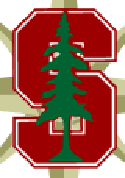

Private, Independent & Highly Selective Colleges If you're interested in Private, Independent, and Highly Selective colleges this page on our website has information specific to the admissions process for these unique types of schools! Summer Enrichment: Students who are planning to apply to highly selective universities should strongly consider doing something of significance over the summer between their Junior and Senior years. It should be related to their intended college major so as to demonstrate passion and commitment to the student's field of study. This can be done by taking a college class or participating in a summer enrichment program. FYI - Naviance has one of the most comprehensive "enrichment program" databases in the world - you should check it out!
Summer Enrichment: Students who are planning to apply to highly selective universities should strongly consider doing something of significance over the summer between their Junior and Senior years. It should be related to their intended college major so as to demonstrate passion and commitment to the student's field of study. This can be done by taking a college class or participating in a summer enrichment program. FYI - Naviance has one of the most comprehensive "enrichment program" databases in the world - you should check it out! "Naviance Student" is a web-based program for academic planning, college, and career research. You will want to become familiar with this program as it is the primary vehicle you will use to:
"Naviance Student" is a web-based program for academic planning, college, and career research. You will want to become familiar with this program as it is the primary vehicle you will use to:- plan your high school academic program
- select your courses for the following school year
- research careers
- research college majors
- determine what colleges to apply to
- request letters of recommendation
- research scholarships
 Juniors will be assigned 39 "Tasks" to complete in Naviance over the summer between their Junior and Senior years to prepare for the college application process that begins in the Fall of the Senior year.
Juniors will be assigned 39 "Tasks" to complete in Naviance over the summer between their Junior and Senior years to prepare for the college application process that begins in the Fall of the Senior year. Click here or on the Naviance logo above for more information about Naviance.NAVIANCE STUDENT For an update on the new updates coming to "Naviance Student" please view the video below.
Click here or on the Naviance logo above for more information about Naviance.NAVIANCE STUDENT For an update on the new updates coming to "Naviance Student" please view the video below. -

